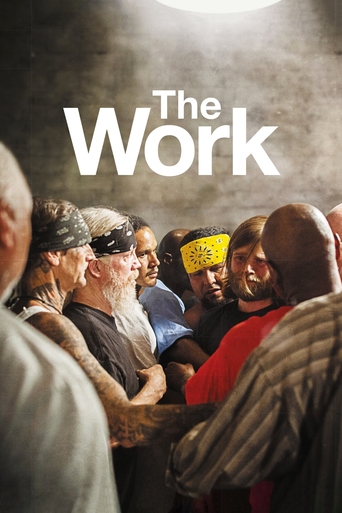Turfseer
Directed by Jairus McLeary and Gerthin Aldous, The Work takes us inside California's maximum security Folsom prison to observe a four day extremely intense group therapy session consisting of both inmates and civilians brought in to participate from the ordinary (non-criminal) world.The documentary begins with these ordinary Joes on the bus driving to the facility and expressing their anxiety about going inside a maximum security prison and having to interact with hardened criminals. Once they enter the room where the therapy sessions take place, they're each quickly paired off with an inmate partner whom they're encouraged to get to know before the actual therapy begins.The therapy itself often involves each man sharing accounts of a difficult relationship or traumatic event that leads to the blocking off of emotional feelings. In some cases the inmates become agitated and are held down by members of the group until they break down in tears. Other times, the mere recounting of a traumatic event leads to an emotional response-usually crying or in some cases, deeper sobbing. In one telling moment, one of the non-inmate participants honestly tells one of the inmates that he is unable to connect with his tale of being abandoned by a rejecting father. The inmate interprets this confession of emotional detachment as a belittlement of his particular situation and lashes out at the man calling him a "bitch" and almost ready to physically attack him.Many of these cathartic moments are difficult to watch as the average viewer may not be used to outpourings of such raw emotion. At the conclusion of The Work, we're informed that every inmate who went through the therapy sessions and was later released from prison, has not returned. That certainly is impressive!Nonetheless, one wonders if the therapy over such a short time period is effective in resolving past traumatic events. One clue that leads to skepticism is the nature of the emoting depicted. In every case, the crying (or sobbing) often seems blocked-as if the men are unable to break through into a deeper level of emotional release. This is understandable given taboos in our society for men to express their feelings. Instead of simply employing a confessional model to evoke emotions, there are other techniques involving physical exercises that can facilitate even deeper release from what the famed psychiatrist Wilhelm Reich referred to as "body armoring." An updated version of Reichian therapy, Bioenergetics, developed by Dr. Alexander Lowen, certainly could be put to good use in therapeutic settings such as this.The bottom line is any technique to uncover repressed emotions, including group therapy sessions with hardened criminals, should be viewed as something positive. Given reports of zero recidivism, this is a program that apparently "works."
waynepetrin
'The Work' was an extraordinary experience exploring individual personal extremes of violent feelings towards others and oneself. The group therapy sessions with three facilitators and about 10 violent prison inmates resonated excruciating memories, with individual outbursts requiring intense therapeutic physical restraint by many peers. Each prisoner's soul searching self disclosures clearly presented to all viewers the fact that violent hatred of others has its source in one's self-hatred. I have experienced these revelations working in therapeutic holds with violent hateful severely disturbed adolescents at Tri-County Youth in Northampton, MA. The notion that hatreds of others are acquired but unrecognized self-hatreds has ramifications beyond group therapy to the world at large. Racism, genocide, wars, colonialism, slavery and much beyond are at their source unrecognized self-hatreds. Christ's forgotten admonitions, 'Don't judge!' and 'Have empathy for your enemies' ring true worldwide as our forthcoming non-violent future. Violence was virtually reduced by half in the 20th century. We're but a few centuries away from our thousands of years of peace.
Minter Dial
The Work is a masterful film. It shows raw and powerful emotions, in a context that is entirely surprising. This film moves because it illustrates that, fundamentally, men inside and outside prison actually have the same types of issues. By so doing, you realise how we on the "outside" share similar baggage with those in prison, even the most hardened criminals. It's a film that cannot leave your neutral.
JustCuriosity
The Work was extremely well-received during its world premiere at Austin SXSW Film Festival where it won the Grand Jury Prize in Documentary Feature Competition. This is one of the most intense films that you will ever see and it literally takes your breath away. It is follows several prisoners – many serving long sentences for violent, often gang-related, crimes - in a group therapy program at Folsom Prison over a four-day period in which they push each other to confront their demons. They discuss their betrayals which often involve deep-seated and painful issues in their family lives. They confront each physically and emotionally. They open up the darkest corners of their lives so that outside observers can understand that much of the anger that made them criminals comes from deep well-springs of personal suffering and often abuse. Indirectly, this film asks a very deep question about our criminal justice system: Is it supposed to warehouse and punish offenders or is it supposed to rehabilitate them to return to society? If it is the former it is doing so at a very great cost. If it is the latter than we need to invest in programs like this so that we can return these men to as productive members of society. This film shows us what rehabilitation looks like and subtly makes that argument. We need a national conversation about how the criminal justice system is failing and about how we can begin to repair it. We have begun discussing some aspects of this complex problem including reconsidering the "War on Drugs," but we also need to be discussing how to rehabilitate those currently imprisoned as well. I hope that it gains distribution so that a wider audience can see this powerful and compelling film and begin this conversation about the criminal justice system.


